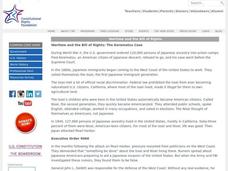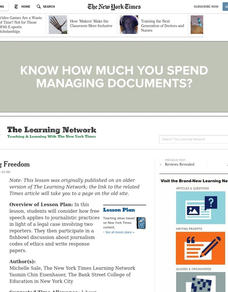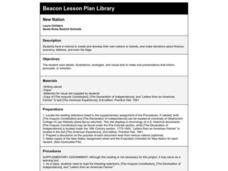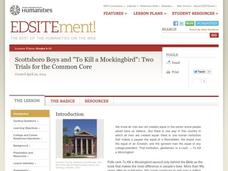Curated OER
Wartime and the Bill of Rights: The Korematsu Case
Students examine the balance between civil liberties and protection. In this national security lesson plan, students explore the Korematsu case which references the Japanese internment camps of World War II. Students draw comparisons...
Curated OER
The Information Revolution: A Hypothetical Case
Learners consider the implications of the information revolution. In this information age lesson, students discuss informatics and the misuse of information. Learners form a fictional bureau of information control and hold a simulated...
Curated OER
Can the Lords Keep Their Jobs?
Learners investigate reform in British Parliament. In this current events lesson, students visit selected websites to learn what the House of Lords is responsible for and determine how their jobs may be changing.
Alabama Department of Archives and History
Runaway Slaves in Alabama: Individual Freedom Fighters in the 1800s
Class pairs examine eight runaway slave advertisements from the mid-1800s to develop an understanding of the conditions slaves faced and of race relations.
Curated OER
Creating A Bill Of Rights In Space
Young scholars define rights, analyze and apply the U.S. Bill of Rights to hypothetical situations, and create an Intergalactic Bill of Rights.
Curated OER
Whose God?
Students investigate religious freedom in the U.S. They watch and discuss a Bill Moyers NOW video, take a Freedom of Religion quiz, write an essay, and participate in a mock trial and debate.
Curated OER
Storytellers: Pearl Jam
Students examine the concept of freedom of speech as it applies to music. They watch and discuss the video, "VH1 Storytellers: Pearl Jam," participate in a class discussion about free speech, conduct research, and conduct a debate.
Curated OER
Bill of Rights -- Americans with Disabilities Act
Students focus on the First and Ninth Amendments of the Bill of Rights. Before visiting a museum, they examine the Americans with Disabilities Act. During the visit, they work together with a museum member to watch a video and get...
Curated OER
Press-ing Freedom
Students consider how free speech applies to journalistic practices in light of a legal case involving two reporters. They participate in a fishbowl discussion about journalism codes of ethics and write response papers.
Curated OER
Does Free Speech Exist in School?
Students examine their own First Amendment rights as students. They read and discuss a news article, discuss the Supreme Court case Frederick v. Morse, take an online quiz and conduct Internet research, and create a brochure outlining...
Curated OER
New Nation
Fifth graders discuss leadership, citizenship, symbols for a nation, how to create peace after reading "The Iroquois Constitution," "The Declaration of Independence," and "Letters from An American Farmer." They create their own nations...
Curated OER
Right to Privacy
Students examine the right to privacy as laid out in the United States Constitution. Using the text, they search the material for specific reference to protection of individual privacy. In groups, they use one provision of the Patriot...
Curated OER
Is Bureaucracy Bad?
Students examine the term bureaucracy and its role in state government. They study the purpose of regulations and explain the role of regulatory agencies in South Carolina. They describe how administrators act as law makers and analyze...
Curated OER
Forming A Government
Students simulate being on an island after their ship has wrecked, or their plane has crashed. Food, fresh water, and shelter are in short supply. They must form a government, develop laws and penalties.
Curated OER
Due Process
Students understand the legal term "due process of law" and its historical origins. They discuss the requirements for "due process of law" in both the U. S. Constitution and the Indiana Constitution and how those rights are similar or...
National Endowment for the Humanities
Scottsboro Boys and "To Kill a Mockingbird": Two Trials for the Common Core
Here's a must-have resource for anyone reading To Kill A Mockingbird or using Harper Lee's award-winning novel in a classroom. The packet contains Miss Hollace Ransdall's first-hand, factual account of the trials of the Scottsboro Boys,...
Curated OER
Search And Seizure In Washington
Students identify legal requirements of searches conducted with and without a warrant, and identify the legal standard for conducting searches in public schools.
Curated OER
Separate But Equal Video
Eighth graders watch the video "Separate But Equal." They choose an incident or event from the video that is interesting or meaningful to them and write an objective news article and an editorial.
Curated OER
The Formation and Function of the Supreme Court
Students analyze the role of the U.S. Supreme Court. They read a handout and Article III, section 1 of the Constitution, analyze and rate by relevance noteworthy Supreme Court cases, and write how they decided each rating.
Curated OER
Utah's Judicial Branch
Seventh graders explain that the judicial branch of Utah's government interprets laws and reviews the consitutionality of laws.
Curated OER
State of Oregon v. Dominguez-Martinez
Students are introduced to the concept of racial profiling. In groups, they analzye the case between Oregon and Dominguez-Martinez and evaluate the use of racial profiling as a tool of policemen. They also discuss the laws in place to...
Curated OER
Tribal Sovereignty Mock Trial
Students discuss the issue of tribal/native nation sovereignty. They review the Constitution of the U.S. and discuss how it legally provides for sovereign nations. Then they participate in a mock trial of the 1823 Supreme Court Case...
Curated OER
History of Supreme Court
Learners study the role of the U.S. Supreme Court in U.S. history. They explore current events about the U.S. Constitution and discuss the Marbury v. Madison case from 1803. They identify the term "judicial review" and judicial...
Curated OER
US Patriot Act: Security vs. Privacy
Students use readings, worksheets and discussion to explore the ramifications of the US Patriot Act which was passed by Congress shortly after September 11th. They review Constitutional Amendments and consider how they relate to the...

























